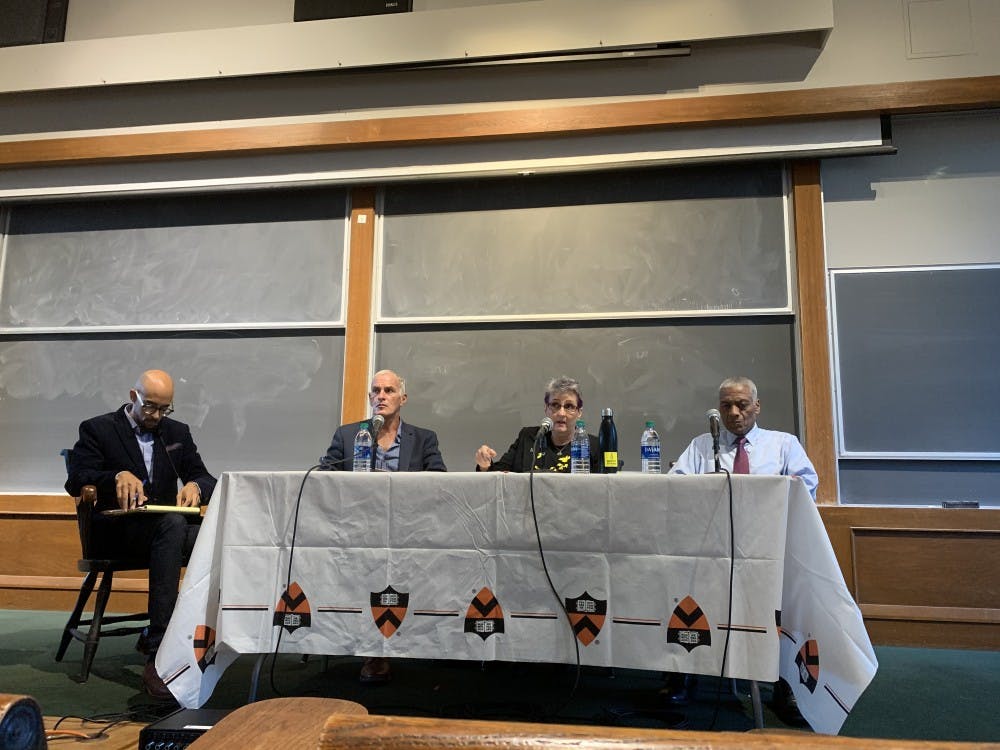Last spring, when the Alliance of Jewish Progressives (AJP) was approached by its allies in the Young Democratic Socialists (YDS) and Princeton Committee on Palestine (PCP) to cosponsor an event with Dr. Norman Finkelstein, it was put to a vote of membership. At the time, I was a co-Chair of the organization, and, like the vast majority of members, I voted in the affirmative. “Fighting for Justice from Gaza to Ferguson: Black and Palestinian Solidarity” was presented as an exciting opportunity for the university community to learn about the concept of solidarity and movement building. As a leader of AJP, I saw our decision to cosponsor the event as not an endorsement of any particular speaker or political message, but rather to deem the event as worthy of attendance and in keeping with our core values.
The panel failed in both respects. Instead of being a productive discussion between panelists, the panel became, in his own words, a “lengthy talk” by Finkelstein on the topic of "Gaza’s martyrdom.” It was primarily a display of Finkelstein’s bullying and bizarre behavior, paired with the invocation of explicit anti-Semitic tropes (including blood libel, the superstition that Jews ritually sacrifice Christians during Passover; an insinuation that Rep. John Lewis was an “Israeli hack” bought off by the “rich Jews” of Atlanta; and a strange stereotype of Jewish political and ethical orientation). He was not wrong to criticize the actions of the Israeli government and military; he was wrong to do so using anti-Semitic language. The topic of black and Palestinian solidarity was barely discussed. I do not regret voting to co-sponsor a panel on the subject, but I deeply regret having supported a panel with Finkelstein present.
In the weeks following the panel, I have learned many lessons about solidarity, none from the event.
Gathering less than 90 minutes from the conclusion of the panel, AJP members discussed the best path forward. Some believed that an apology was required, others a more limited rebuke of Finkelstein’s uses of specific tropes, and others wished to say nothing, finding either no fault in what was said, or believing that what Finkelstein uttered was “not malicious anti-Semitism.” Fierce debates took place, and eventually a large section of AJP’s membership decided to write a statement condemning Finkelstein’s use of the blood libel trope. While I believe that the statement did not go far enough, and as a result I did not sign, it attempted make clear that such rhetoric was unacceptable.
Even among those that signed the statement, there were many AJP members reluctant to say anything, believing that it was important to stand with PCP and YDS. These AJP members did not wish to leave fellow left-wing organizations and activists “out to dry” for the invitation of Finkelstein; they were devoted to building left-wing solidarity on this campus. This sentiment, however, did not cut the other way around. As a result, the only co-sponsor of the panel that tried to rebuked the anti-Semitism present at “Fighting for Justice from Gaza to Ferguson” was a Jewish organization.
YDS and PCP failed to demonstrate solidarity with many of their Jewish allies in AJP. In the past, all three organizations have successfully worked together to oppose speakers that “foster an atmosphere of incivility … or promote racism or hatred of any kind.” This description aptly matches Finkelstein’s behavior. YDS and PCP’s lack of condemnation will make it more difficult for them to demand that bigoted speakers not be invited into campus dialogue in the future. I am saddened that organizations that I had believed to be allies chose to condone antisemitic tropes, failing not just Jewish allies, but the university community, as a whole.
As someone that has worked on this campus, including with YDS and PCP, in opposition to the Israeli occupation, the extremity of its blockade of Gaza, and violation of human rights, I know that it is possible to organize events about the Israeli-Palestinian conflict without inviting hateful speech (whether it be anti-Arab, Islamophobic, or anti-Semitic). However, we can only succeed in this effort when we operate as good-faith actors, uncompromising on our moral-political compasses, regardless of whether it requires self-criticism or the alienation of famous speakers. Left-wing solidarity requires consistency in its opposition to manifestations of hatred, and it demands that we rebuke friends when they let us down.
I apologize for the role I played in organizing an event that devolved into a showcase of disturbing language. I am unapologetic regarding the need for a broad coalition that speaks in universal opposition to all forms of oppression.

Zachariah Sippy is a sophomore from Lexington, Kentucky. He can be reached at ZSippy@Princeton.edu.









